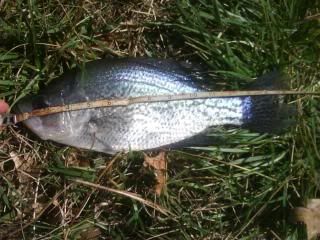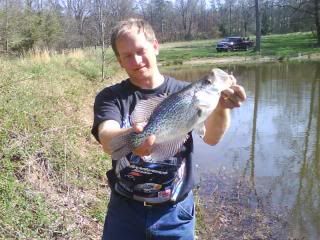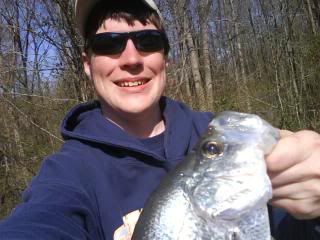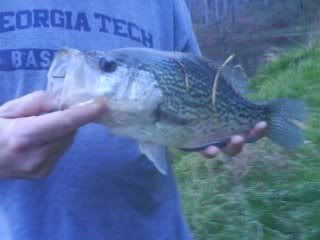Long but worth the read if you want the skinny on sources of info and main ideas on Crappie.
http://www.pondboss.com/forums/ubbthreads.php?ubb=showflat&Number=62560&fpart=10AFS has had 3 symposia on Crappie covering many years of research. Here is a historical of the papers which will show you the ideas that have come up and a glimpse of the results. I have included some parts and omitted others including the list of authorities.
Challenges of Crappie Management Continuing into the
21st Century
JEFF BOXRUCKER*
ELISE IRWIN
White crappie Pomoxis annularis and black
crappie P. nigromaculatus are among the principle
species sought by anglers in the midwestern and
southeastern United States. The focus of management
activities aimed at improving crappie fisheries
has shifted over the years, and the published
literature reflects this shift. Three symposia on
crappies sponsored by the American Fisheries Society
have been significant contributors to the body
of knowledge on crappie ecology and management.
The third in this series, entitled ‘‘Challenges
of Crappie Management Continuing into the 21st
Century,’’ was held at the society’s 130th Annual
Meeting in St. Louis, Missouri, in 2000. The organizers’
objective was to compile the most current
work on crappie ecology and management and
help set the direction for research in the next decade.
This
introduction will try to show how the focus of
research has shifted and the role that these symposia
have played in that shift.
Mitzner (1984) identified the ‘‘small-crappie
syndrome’’ as a common theme in papers from the
first crappie symposium, ‘‘Crappie Management:
Problems and Solutions,’’ which was held at the
44th Midwest Fish and Wildlife Conference in
1982. As early as the 1940s, management activities
centered on reducing abundance through mechanical
or chemical removal. These techniques have
been used sparingly over the past 30 years because
of their high costs and short-term benefits. Investigations
of the interactions within crappie trophic
communities (O’Brien et al. 1984; Ellison 1984)
published in the first symposium led Mitzner
(1984) to conclude that management activities
were moving toward prey management. Published
accounts of the effects of prey stockings on crappie
population structure range from beneficial effects
on community food webs (Bartholomew 1966; Li
et al. 1976; Mosher 1984) to neutral effects (Boxrucker
1986; Boxrucker 1993; Hale 1996) and potentially
negative effects (Crowl and Boxrucker
1989; DeVries and Stein 1990; Guest et al. 1990;
DeVries et al. 1991). Mitzner (1984) also set the
stage for another shift in management strategies
by pointing out that managing angler harvest has
the potential to rectify the small-crappie syndrome.
A second crappie symposium, entitled ‘‘Crappie
Biology and Management,’’ was held
in 1990. Many of the papers published in connection
with this symposium were descriptive in nature,
with the topics including culture (Smeltzer
and Flickinger 1991), aging (Hammers and Miranda
1991; Sweatman and Kohler 1991), movements
and habitat use (Markham et al. 1991), relative
weight (Neumann and Murphy 1991), and
population characteristics (McDonough and Buchanan
1991; McInerny and Degan 1991; Colvin
1991a). The first accounts of the effects of minimum
length limits on crappie population structure
were published in the proceedings of this symposium
(Colvin 1991b; Webb and Ott 1991). Reed
and Davies (1991) and Larson et al. (1991), also
participants in this symposium, cautioned against
the use of restrictive harvest regulations due to the
high levels of natural mortality seen in some crappie
populations in Alabama and Georgia. Published
accounts of the use of length limits to manage
crappie fisheries increased following this symposium
(Allen and Miranda 1995; Allen et al.
1998; Maceina et al. 1998; Hale et al. 1999; Boxrucker
2001). The use of length limits in crappie
fisheries has been refined, with either a 229-mm
or a 254-mm limit being used depending on the
population’s growth rate. Equilibrium yield models
have assisted in refining the use of length limits
(Maceina et al. 1998; Slipke and Maceina 2001).
Currently, 15 of 27 states in the Northcentral and
Southern Divisions of the American Fisheries Society
manage crappie fisheries with length limits.
Crappie recruitment was historically thought to
be cyclic, with strong year-classes being produced
every 2 to 5 years (Swingle and Swingle 1967).
However, despite the importance of crappies as
sport fish, little research into the factors affecting
their recruitment has been published. Environmental
variables were identified as possible influences
on year-class strength (Jenkins 1955; Goodson
1966; Mathur et al. 1979), yet little cause-andeffect
data were presented. In the first crappie symposium,
O’Brien et al. (1984) discussed the effects
of abiotic factors on the survival of early life stages.
In the second crappie symposium, Mitzner
(1991) presented the relationships between crappie
year-class strength and various environmental variables,
including water level, turbidity, substratum,
and wind.
Crappie recruitment dynamics were the focus of
an increasing amount of research in the 1990s.
Water temperature influences spawning times and
subsequent growth and survival, with later-hatching
cohorts experiencing higher temperatures,
growth, and survival (Pine and Allen 2001). Dubuc
and DeVries (2002) failed to identify consistent
relationships between reservoir productivity and
larval crappie density. Guy and Willis (1995)
found differences in the recruitment variability of
crappies in South Dakota based on landscape characteristics.
Recruitment was less variable in systems
with high shoreline development indices (i.e.,
more embayments). The recruitment of black crappies
in South Dakota was also less variable in systems
with high watershed : water body surface area
ratios (Guy and Willis 1995). Water level fluctuations
have increasingly been suggested as a primary
influence on crappie recruitment. High inflows
and subsequent water releases in spring and
summer can lead to the reduced recruitment of
crappies (Pope et al. 1996; Maceina and Stimpert
1998). High winter water levels had a positive influence
on crappie year-class strength in Alabama
tributary impoundments (Maceina and Stimpert
1998), yet the mechanisms underlying this relationship
are not clear. Allen and Miranda (2001)
used a population model to conclude that crappie
recruitment was quasi-cyclic due to random fluctuations
in the environmental variables and density-
dependent mechanisms. Allen and Miranda
(1998) developed an age-structured model to help
explain the effects of erratic recruitment on crappie
management alternatives, particularly the use of
length limits.
Information from the two previous symposia on
crappies set the stage for the papers from this symposium.
Whereas the majority of manuscripts from
the 1990 symposium were descriptive, most of
those that follow evaluate management strategies.
Six of the papers deal with exploitation. Estimates
of exploitation were typically made from tagreturn
data and were subsequently used in conjunction
with catch curves to estimate natural mortality
rates. This information was then used to
model the potential effects of length limits on crappie
fisheries (Boxrucker 2002a, this issue; Isermann
et al. 2002a, this issue). Miranda et al. (2002,
this issue) found that the uncertainty surrounding
estimates of tagging mortality, tag loss, and particularly
reporting rate led to imprecise estimates
of exploitation in spite of the high costs of data
collection. These authors suggested that indirect
measures of exploitation (i.e., condition, total mortality
estimates, length and age distributions, and
increased recruitment variability) be used rather
than expensive tag-and-reward programs. Isermann
et al. (2002a) used equilibrium yield models
to evaluate Tennessee’s statewide 254-mm minimum
length limit on the yield of crappie fisheries.
The authors grouped the study reservoirs into three
categories: those in which 229-mm or 254-mm
length limits would increase yield, albeit at the
expense of the number of crappies harvested; those
in which length limits had no impact on yield; and
those that were negatively impacted by length limits.
The authors suggested that applying length
limits to fisheries using a categorical approach was
preferable to using a single, areawide regulation.
Bister et al. (2002, this issue) and Hurley and Jackson
(2002, this issue) reported decreased growth
rates in crappie populations in South Dakota and
Nebraska, respectively, as a result of length limit
regulations. The 229-mm length limit was removed
from Lake Alvin, South Dakota (Bister et
al. 2002), while Hurley and Jackson (2002) recommended
removing the 254-mm length limit
from two small Nebraska impoundments for only
a portion of the year to help maintain crappie densities.
Boxrucker (2002a) detailed population and
angler creel characteristics prior to, during, and
after the removal of a 254-mm length limit at an
Oklahoma reservoir. Even though the abundance
of quality- and preferred-size crappies and angler
catch rates improved as a result of the length limit,
angler dissatisfaction with the regulation led to its
removal. This is in contrast to the positive angler
sentiment in regards to harvest restrictions in the
Sardis Lake, Mississippi, crappie fishery (Dorr et
al. 2002, this issue).
Recruitment has been a common theme in all
three crappie symposia. McKeown and Mooradian
(2002, this issue) found that neither the low
density of adult stocks nor the overwinter mortality
of age-0 crappies was the cause of reduced
recruitment (relative to historical levels) in Chautauqua
Lake, New York. The authors concluded
that management efforts aimed at increasing adult
density would have little effect on recruitment
and the subsequent recovery of the fishery to historical
levels. Sammons et al. (2002, this issue)
found that crappie recruitment in Tennessee tributary
impoundments was positively related to
high water levels during the prespawning period
(January through March). Maciena and Stimpert
(1998) found a similar relationship in Alabama
tributary impoundments.
Two papers in this symposium dealt with supplemental
stocking, a little-used technique to improve
crappie recruitment. The results of stocking
black-nosed crappies (a morphological variant of
the black crappie) in Tennessee impoundments
were mixed, with contributions to year-class
strength ranging from 0% to 93% (Isermann et al.
2002b, this issue). Racey and Lochmann (2002,
this issue) determined that the year-class contribution
of white crappies stocked into Lake Chicot,
Arkansas, ranged from 0% to 3.1% and concluded
that other management options to improve adult
abundance should be considered.
Stocking predators to reduce the abundance of
slowly growing populations of crappies was the
topic of two papers in this symposium. The concept
was introduced by Willis et al. (1984) in the
first crappie symposium. Saugeyes (walleye Stizostedion
vitreum 3 sauger S. canadense) were
stocked into Richmond Lake, South Dakota, to improve
the size structure of a black crappie population
(Galinat et al. 2002, this issue) and into
Thunderbird Reservoir, Oklahoma, to improve that
of a slowly growing white crappie population
(Boxrucker 2002b, this issue). The growth rates
and size structure of both crappie populations improved
following the introduction of the saugeyes.
Boxrucker (2002b) cautioned that consideration
must be given to the effects of such biomanipulation
on all trophic levels and that thorough evaluations
need to be conducted both before and after
implementing it.
Spier and Heidinger (2002, this issue) investigated
the effects of turbidity on the growth of juvenile
and adult black and white crappies. No differences
were found in the growth of juveniles,
but the weight gain of adult black crappies was
higher than that of adult white crappies at low
turbidity.
The importance of crappies as sport fish ensures
that research into their ecology and management
will continue. Recruitment dynamics appear to be
the focus of current work, with water level manipulation
having the potential to significantly impact
year-class strength. The expanded use of
population models will assist managers in selectively
applying harvest regulations. Many crappie
populations have a high rate of natural mortality
that negates the potential benefits of length limits,
even when there is fast growth and high exploitation.
Research into the causative mechanisms in
populations exhibiting high natural mortality will
broaden management alternatives.
Acknowledgments
This symposium was sponsored by the Fisheries
Management Section of the American Fisheries
Society.
 [/img]
[/img]





